For many years, there has been a myth that African Americans are more likely to be homophobic and thus more likely to oppose advances for LGBT equality. Conservatives have even tried to leverage this supposed wedge to slow the progress of equality. A new survey, however, not only debunks the myth, but suggests that the black community is one of the LGBT community’s strongest allies.
The Myth
After California passed Proposition 8, a constitutional ban on same-sex marriage, The Advocate magazine asked on its cover, “Gay Is The New Black?” Following the lead set by Dan Savage in his “Black Homophobia” post the day after the 2008 election, the cover story relied on exit polls from the election that seemed to suggest that even though black voters largely supported Barack Obama for president, they also largely supported Prop 8.
This mythical divide between the two communities has persisted in the years since, despite the fact that the Prop 8 numbers were later debunked. Just last year, for example, writer Michael Arceneaux called out Lee Daniels for his claim that his television show Empire would “blow the lid off homophobia” in the black community, when it actually seemed to be reinforcing the myth. “Blacks are not the X-Men of anti-gay bigotry,” he wrote. “We don’t have some superior level of homophobia compared to other groups.”
Opponents of LGBT equality have, in turn, tried to capitalize on the supposed black/gay divide. A 2009 National Organization for Marriage (NOM) strategy memo revealed a blatant attempt to “drive a wedge between gays and blacks” by convincing black people not to see same-sex marriage as a civil right.
But NOM’s strategy didn’t work, and as new research from the Public Religion Research Institute (PRRI) demonstrates, it didn’t work for the exact reason that they thought it would.
The Survey
PRRI’s massive survey focused on three general questions: support for marriage equality, support for LGBT nondiscrimination protections, and support for “religious refusal” exemptions — allowing businesses to refuse service to LGBT people based on their religious beliefs.
Support for marriage equality was a bit low among Black Protestants, with only 38 percent supporting and 54 percent opposing. But on the other two measures, Black Protestants overwhelmingly supported LGBT equality. They favored nondiscrimination laws 64–31, and on the question of religious refusals, black respondents actually opposed exemptions at higher rates than any other racial group, including white respondents:
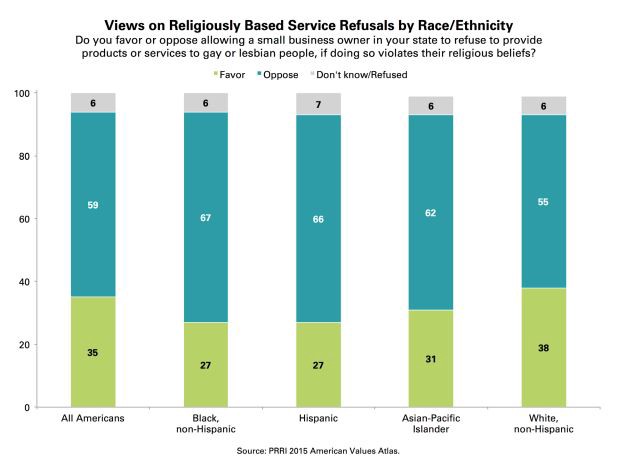
Among all respondents, those who supported marriage equality tended to also support nondiscrimination laws, while opponents of marriage equality were more divided. The swing among black respondents seemed to be particularly compelling, so ThinkProgress reached out to PRRI to see if there were more answers in the numbers.
As it turns out, marriage equality and nondiscrimination protections are simply two very different questions for black respondents. For example, among black Protestants who oppose same-sex marriage, a 51 percent majority still favor LGBT nondiscrimination protections — albeit not quite as strongly:
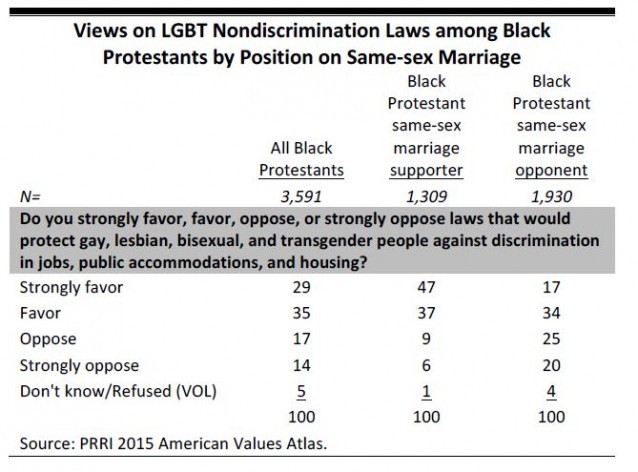
Likewise, black Protestants who opposed marriage equality still overwhelmingly opposed (62–34) allowing businesses to discriminate for religious reasons:
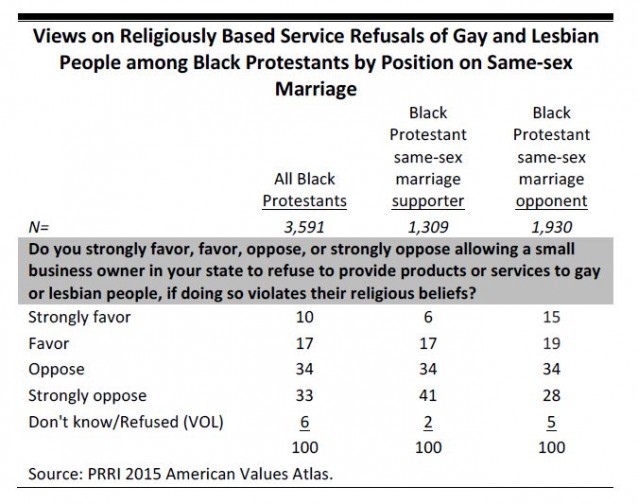
PRRI also examined whether identifying as a Protestant itself motivated how respondents felt about LGBT protections. Overall, black Protestants supported the protections at almost identical rates as those who did not identify as Protestants:
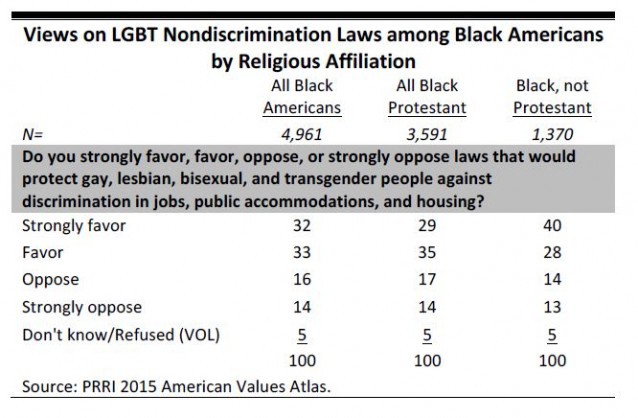
Likewise, identifying as a Protestant had little impact on whether black respondents opposed allowing religious refusals:
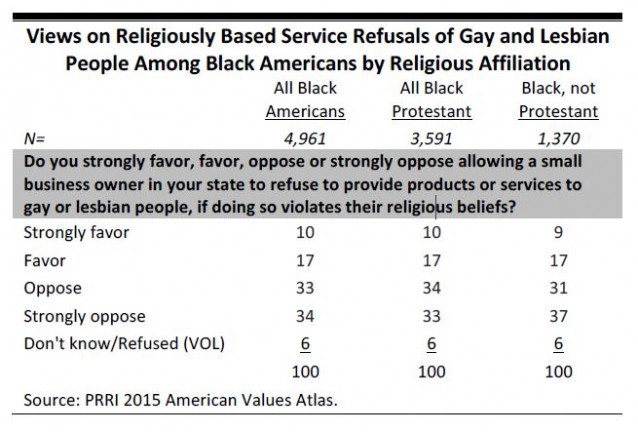
It also turns out that, like religion, geography isn’t even a factor for black support of LGBT nondiscrimination protections. Alabama and Mississippi were two states PRRI identified as having some of the lowest support nationwide, but black Protestants in those states still supported LGBT protections and opposed religious refusals at fairly similar rates to the rest of the country:
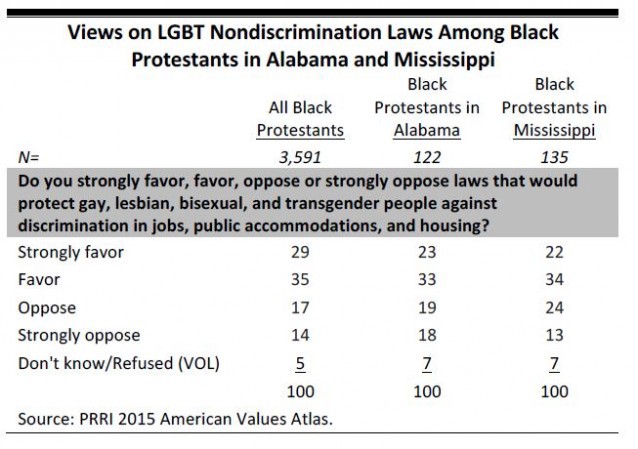

Dispelling The Myth
Dr. Robert Jones, CEO of PRRI, told ThinkProgress that even on the question of marriage equality, black Protestants are more ambivalent than white evangelical Protestants, who oppose same-sex marriage at much higher rates. On LGBT nondiscrimination protections and religious refusals, their support flips. “I think that’s about really their own experience with discrimination,” he explained.
“The thing that African Americans and evangelicals have in common is a very strong connection to religion and particularly religion that has a fairly literal view of the Bible. They have high levels of religious attendance and fairly traditional religious beliefs, and I think that leads to some ambivalence on the issue of marriage equality.”
But on nondiscrimination, there’s a real “parting of the ways,” he said, “where an experience as a racial minority is informing and influencing their views on these issues that it just doesn’t among white evangelicals.”
Isaiah Wilson, external affairs manager of the National Black Justice Coalition, agreed. Calling the survey “refreshing,” Wilson told ThinkProgress that he was “not at all surprised” by black respondents’ support for LGBT protections.
“Black communities are broad, diverse and share a deep understanding of inequality gained from a common history and experience. We collectively know how it feels to be systemically oppressed and rejected by the state and that is not morally right for any group,” he said.
He conceded that there is still more work to be done on the divisiveness over marriage, but noted that “the majority support of young black respondents is the silver lining and shows that as we continue to move forward support will grow.”
The survey also addresses the biggest problem in the mythical divide between black and queer communities: the erasure of people who identify with both. “The survey made me reflect on the fact that there are over one million self-identifying black LGBTQ people who are living their truth for all to observe, including their families,” Wilson shared. “This plays a major role in the way our communities are dealing with the issues of LGBT equality and overall acceptance.”
Moving Forward
What Jones felt was one of the most important takeaways from the survey is the fact that there is broad national consensus on protecting LGBT people from discrimination. “We’re used to a lot of divisions and debates around marriage equality — even that over the years has become less contentious,” he said. “But what’s remarkable is that the place where there is probably the most consensus — on nondiscrimination laws — is also the place where we have the biggest patchwork of laws on the ground. It’s a little ironic.”
The Supreme Court established marriage equality nationwide, but 28 states still offer no statewide nondiscrimination protections.
Wilson agreed, pointing out that the work that needs to be done is the same across the board. “The state of homophobia within the black community is only a reflection of the broader American culture, which finds itself in a continuous evolution in favor of the demands that define the LGBTQ equality movement.” He hopes that increased visibility of LGBT people will continue to advance acceptance and inclusion.
